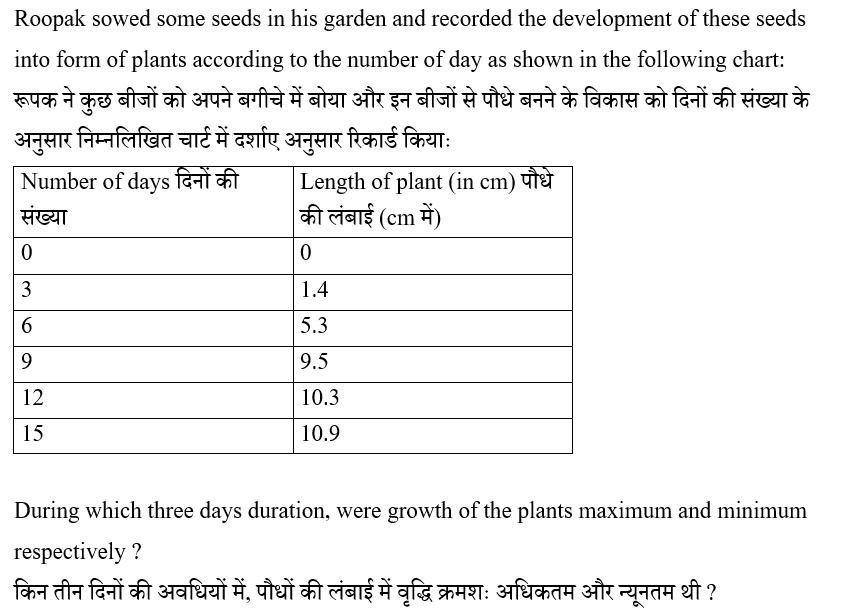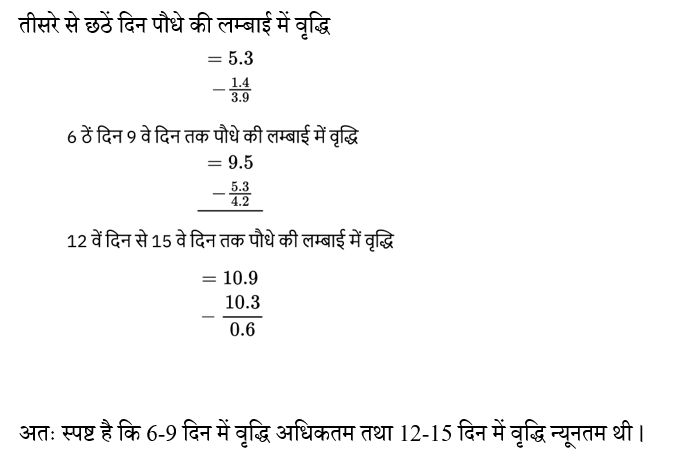Question 1:
The marks obtained by 30 students in a mathematics test are as shown below:
7, 1, 3, 6, 5, 5, 5, 0, 7, 8, 1, 9, 0, 5, 8, 3, 1, 8, 10, 10, 4, 3, 8, 6, 8, 9, 2, 1, 0, 4
The number of students obtaining more than or equal to 5 marks is :
गणित के एक टेस्ट में 30 विद्यार्थियों द्वारा प्राप्त किए गए अंक नीचे दिए गए हैं
7, 1, 3, 6, 5, 5, 5, 0, 7, 8, 1, 9, 0, 5, 8, 3, 1, 8, 10, 10, 4, 3, 8, 6, 8, 9, 2, 1, 0, 4
5 से अधिक या उसके बराबर अंक प्राप्त करने वाले विद्यार्थियों की संख्या है
Question 2:
What is the product of the smallest prime number and any whole number (except 0)?
सबसे छोटी अभाज्य संख्या और (0 को छोड़कर) किसी भी पूर्ण संख्या का गुणनफल क्या होगा?
Question 3: 
Question 4:
Find the perimeter of a circle of radius 15 cm.
15 cm त्रिज्या वाले वृत्त का परिमाप ज्ञात कीजिए।
Question 5:
If in triangle ABC, the ratio of angles is 4:3:5, then find the angles.
यदि त्रिभुज ABC में, कोणों का अनुपात 4:3:5 है, तो कोण ज्ञात कीजिए।
Question 6: 
Question 7:
The ratio of the ages of Kamal and Kiran is 4 : 5. After 6 years Kamal's age will be 30 years. What is Kiran's present age?
कमल और किरण की आयु का अनुपात 4 : 5 है। 6 वर्ष बाद कमल की आयु 30 वर्ष होगी। किरण की वर्तमान आयु कितनी है?
Question 8:
Which of the following is not a stage of school education as recommended in National Education policy, 2020?
निम्नलिखित में से कौन- सा स्कूली शिक्षा का एक स्तर नहीं है जो कि राष्ट्रीय शिक्षा नीति, 2020 में प्रस्तावित है ?
Question 9:
According to National Curriculum Framework, 2005, which among the following is not the prime objective of teaching measurement in primary classes?
राष्ट्रीय पाठ्यचर्या रूपरेखा, 2005 के अनुसार, निम्नलिखित में से कौन-सा प्राथमिक कक्षाओं में मापन के शिक्षण का मुख्य उद्देश्य नहीं है?
Question 10:
A child writes number names against each number as/एक बच्चा प्रत्येक संख्या के आगे संख्या के नाम इस तरह से लिखता है
1: One / वन
2: To / टू
3: Three/ थ्री
4 : For / फोर
5 : Five / फाइव
Which of the following is correct for the given context ? / निम्नलिखित में से कौन-सा दिए गए संदर्भ के लिए सही है?


